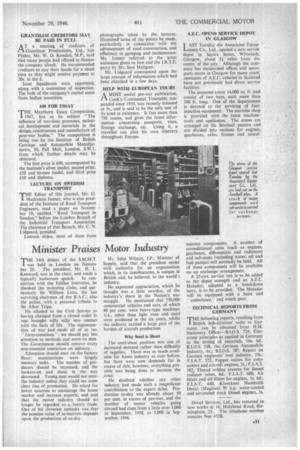Minister Praises
Page 33

If you've noticed an error in this article please click here to report it so we can fix it.
Motor Industry
THE 34th dinner of the S.M.M.T. was held in London on November 20. The president, Mr. H. L. Kenward, was in the chair, and made a typically humorous speech. In connection with the Jubilee festivities, he thanked the motoring clubs, and particularly Sir William Letts, the last
surviving chairman of the also the police, with a personal tribute to Sir Alker Tripp.
He alluded to the Civil Service as having changed from a closed order to one brought witty nilly into contact with the facts of life. The regimentation of war had made all of us too " form-conscious "; we should pay less attention to methods and more.to men. The Government should remove every .non-essential restriction on industry.
Education should start on the factory floor; examinations were largely memory tasks. The number of producers should be increased, and the lookers-on and those in the way decreased. Young men would not enter the industry unless they could see some clear line of promotion. He asked for lower taxation to encourage the home market and increase exports, and said that the motor industry should no longer be regarded as a luxury trade. One of his cleverest remarks was that the pension value of to-morrow depends upon the production of to-day. Mr. John Wilmot, J.P., Minister of Supply, said that the president spoke with authority for an organization which, in its ramifications, is unique in British and, he believed, in the world's industry. He expressed appreciation, which he thought was a little overdue, of the industry's share in the Nation's war struggle. He mentioned that 750,000 commercial vehicles and cars, of which 80 per cent, were heavy-type machines (i.e., other than light vans and cars) were produced in the six years, whilst the industry carried a large part of the burden of aircraft production.
Why Steel is Short • The steel-sheet position was one of increased demand rather than difficulty of supplies. There was as much available for home industry as ever before, but there were now demands far in excess of this; however, everything possible was being done to increase the .total.
He doubted whether any other industry had made such a magnificent contribution to the export drive. Production to-day was arready about 50 per cent, in excess of pre-war, and the number of motor vehicles going abroad had risen from a little over 1,000 in September, 1938. to 5.000 in September, 1946. taneous components. A number of reconditioned units (such as engines, gearboxes, differentials and radiators) and sub-units (including water, oil and fuel pumps) will normally be held. All of these components will be available on an exchange arrangement. A 25-cwt. service van is to be added to the depot strength and an A.E.C. Matador, adapted as a breakdown lorry, is to be provided. The Matador will be equipped with a hoist and " ambulance," and winch gear.
TECHNICAL REPORTS FROM GERMANY
-THE following reports, resulting from 1 British industrialists' visits to Germany, can be obtained from H.M. Stationery Office:—B.I.O.S. 724, Electronic principles as applied in Germany to the testing of materials, 16s. 6d.; B.I.O.S. '768, the German Automobile Industry, 6s.; B.I.O.S. 787, Report on German engineers' tool industry, 195.;
525, Poppet valves for automotive and aircraft engines, 2s.; E.I.A.T. 582, Thread rolling process for finned radiator tubes, 6d.; F.I.A.T. 600, Air filters and oil filters for engines, Is. 6c1.; 640, Kloeckner Humboldt. Deutz (Magirus) 70 h.p. water-cooled and air-cooled truck Diesel engines, 3s.
Diesel Services, Ltd., has removed to new works at 14, Holyhead Road, Birmingham, 21. The telephone number remains Nor 4528.
























































































